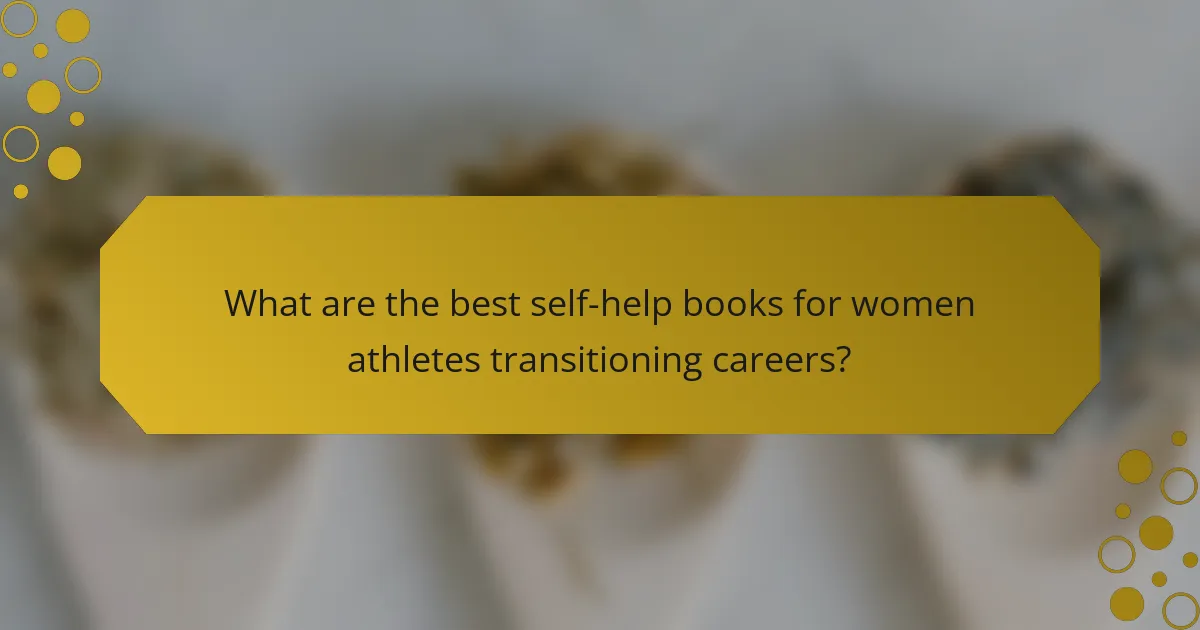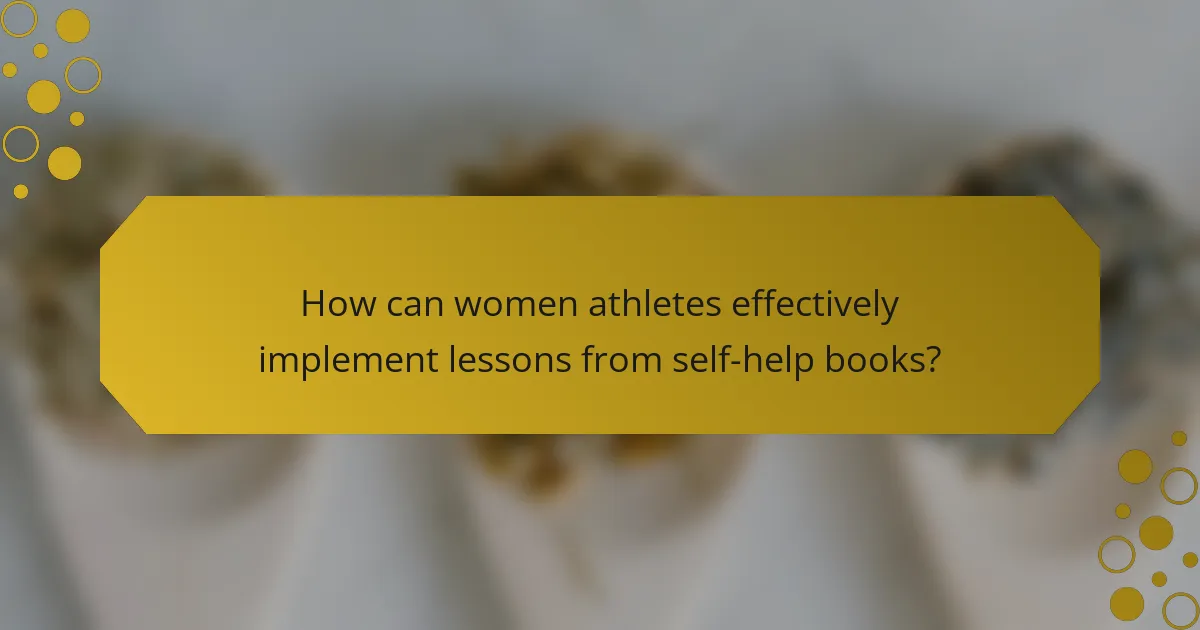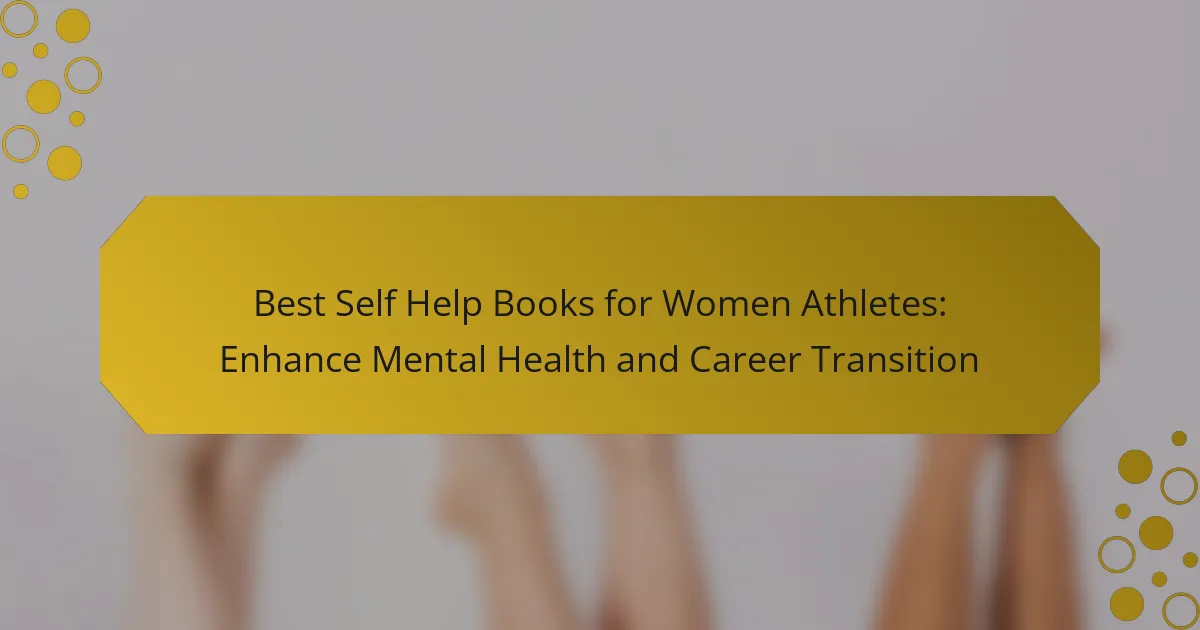Women athletes face unique challenges during career transitions, impacting their mental health and professional development. This article explores self-help books that enhance confidence, resilience, and leadership skills. Key titles include “The Confidence Code,” “Daring Greatly,” and “Lean In,” offering practical strategies for navigating change. Implementing lessons from these resources can foster a growth mindset and improve overall performance.

What are the best self-help books for women athletes transitioning careers?
The best self-help books for women athletes transitioning careers include “The Confidence Code” by Katty Kay and Claire Shipman, “Daring Greatly” by Brené Brown, and “Lean In” by Sheryl Sandberg. These books focus on building confidence, embracing vulnerability, and navigating leadership challenges. Each offers unique insights relevant to athletes facing career changes, enhancing mental health and professional development. “The Confidence Code” emphasizes the importance of self-belief, while “Daring Greatly” encourages resilience through vulnerability. “Lean In” provides strategies for women to assert themselves in the workplace.
How can self-help books enhance mental health for female athletes?
Self-help books can significantly enhance mental health for female athletes by providing strategies for resilience, self-empowerment, and stress management. These resources often address unique challenges faced by women in sports, promoting a positive mindset and emotional well-being. For example, books like “The Confidence Code” offer insights on building self-assurance, while “Mindset” emphasizes the importance of a growth mindset in overcoming obstacles. Engaging with these texts can facilitate career transitions by equipping athletes with tools to navigate change effectively. Ultimately, the right self-help book can serve as a valuable companion in fostering mental strength and personal growth.
What unique challenges do women athletes face during career transitions?
Women athletes face unique challenges during career transitions, including identity loss, lack of support, and societal expectations. These factors can significantly impact their mental health and career decisions. Research indicates that many women struggle with redefining their self-worth outside of sports, leading to anxiety and uncertainty. Additionally, the limited availability of resources tailored to women athletes exacerbates these challenges. Self-help books specifically addressing these issues can provide valuable strategies for navigating transitions and enhancing mental resilience.
What psychological impacts accompany the end of an athletic career?
The end of an athletic career often leads to psychological impacts such as identity loss, anxiety, and depression. Women athletes may experience heightened challenges during this transition due to societal pressures and expectations. Research indicates that self-help books tailored for women athletes can provide strategies for coping with these psychological effects. Titles focusing on mental resilience and emotional well-being empower athletes to navigate their career changes effectively. Engaging with these resources can enhance mental health and facilitate a smoother transition into post-athletic life.
How do societal expectations influence women athletes’ post-career planning?
Societal expectations significantly impact women athletes’ post-career planning by shaping their perceptions of success and identity. These expectations often pressure athletes to conform to traditional roles, influencing their career transitions. Many women athletes face challenges in navigating career options due to societal norms that prioritize family and domestic roles over professional ambitions.
Research indicates that women athletes who engage with self-help resources can better manage these societal pressures. Books focused on mental health and career transition provide strategies for redefining success and exploring diverse career paths. For instance, literature on resilience can empower women to embrace non-linear career trajectories.
Moreover, societal expectations can create a unique attribute of heightened anxiety regarding post-career identity. This anxiety can deter women from pursuing careers in coaching, sports management, or entrepreneurship. Self-help books addressing these issues can offer practical tools to build confidence and self-advocacy.
Ultimately, addressing societal expectations through targeted self-help literature can enhance women athletes’ mental health and facilitate smoother transitions into post-career opportunities.
What universal themes are present in self-help literature for athletes?
Self-help literature for athletes often emphasizes universal themes such as resilience, self-discipline, and mental toughness. These themes are crucial for women athletes navigating mental health challenges and career transitions. Many books underscore the importance of a growth mindset, enabling athletes to learn from setbacks. Additionally, the focus on community and support networks highlights the role of mentorship in personal development. Finally, the integration of mindfulness and self-care practices addresses the unique pressures faced by female athletes, promoting overall well-being.
What common strategies do these books recommend for mental resilience?
Best self-help books for women athletes recommend strategies like positive self-talk, visualization techniques, and goal setting to enhance mental resilience. These approaches help build confidence and focus during challenging situations. Additionally, cultivating a growth mindset and practicing mindfulness are emphasized for managing stress and maintaining motivation. These strategies collectively contribute to improved performance and well-being.
How can goal-setting techniques improve post-career transitions?
Goal-setting techniques can significantly enhance post-career transitions for women athletes by providing clarity and direction. These techniques help individuals set specific, measurable, achievable, relevant, and time-bound (SMART) goals, which can ease the transition process.
Research shows that structured goal-setting can improve mental health by reducing anxiety and increasing motivation. For instance, athletes who set personal development goals often report higher levels of satisfaction and purpose after their sports careers.
Additionally, goal-setting fosters resilience, enabling former athletes to navigate challenges effectively. By focusing on attainable objectives, they can build confidence in their new endeavors, whether in education, business, or community engagement.
In summary, effective goal-setting equips women athletes with essential skills for a smooth transition, ultimately enhancing their mental well-being and future success.
What unique attributes make certain self-help books stand out for women athletes?
Certain self-help books stand out for women athletes due to their unique attributes, such as tailored strategies for mental resilience, insights on balancing athletic and personal life, and a focus on gender-specific challenges. These books often incorporate relatable narratives from successful female athletes, providing both inspiration and practical advice. Additionally, they emphasize community support and collaboration, which are crucial for women’s empowerment in sports.
Which authors are recognized for their expertise in sports psychology?
Experts in sports psychology include notable authors like Dr. Jim Taylor, Dr. Michael Gervais, and Dr. Joan Vickers. Their works focus on mental training and performance enhancement for athletes. Dr. Taylor’s “The Sports Psychology Workbook for Coaches” offers practical strategies. Dr. Gervais emphasizes mindfulness in “Finding Mastery.” Dr. Vickers’ research on visual perception aids athletes’ performance. These authors provide valuable insights for women athletes seeking to enhance mental health and navigate career transitions.
What specific case studies are highlighted in these books?
Several case studies in “Best Self Help Books for Women Athletes” illustrate the mental health challenges and career transitions faced by female athletes. For instance, “The Champion’s Mind” by Jim Afremow highlights the story of a female Olympian overcoming anxiety through mental conditioning techniques. Additionally, “Grit” by Angela Duckworth features case studies on women athletes who exemplified perseverance, showing how resilience contributed to their success. “Relentless” by Tim S. Grover shares insights from female athletes who navigated career changes, emphasizing the importance of mental toughness in their transitions. These examples underscore the unique journeys of women in sports, focusing on mental health and career resilience.
What rare insights can be gained from lesser-known self-help books?
Lesser-known self-help books offer unique insights that can significantly benefit women athletes during career transitions. These books often explore unconventional strategies and mental frameworks that mainstream titles may overlook. For instance, “The Creative Athlete” emphasizes embracing creativity to enhance performance, while “Mindful Movement” integrates mindfulness techniques tailored for athletes. These rare attributes can foster resilience and adaptability, essential for navigating career changes. By tapping into these insights, women athletes can cultivate a more holistic approach to mental health and professional growth.
Which unconventional methods are suggested for managing identity loss?
Unconventional methods for managing identity loss include journaling, creative expression, and mindfulness practices. These strategies help women athletes reconnect with their sense of self during career transitions. Journaling allows for reflection and emotional processing, while creative expression through art or music can facilitate personal exploration. Mindfulness practices, such as meditation or yoga, promote self-awareness and acceptance, essential for navigating identity changes.
What unique perspectives do these books offer on finding new passions?
These books offer unique insights on discovering new passions through personal stories and practical exercises. They emphasize the importance of resilience and self-discovery, helping women athletes navigate transitions in their careers. Each book presents strategies to identify interests beyond sports, fostering a holistic approach to personal growth. For instance, they encourage reflection on values and experiences, which can reveal hidden passions and new opportunities.

How can women athletes effectively implement lessons from self-help books?
Women athletes can implement lessons from self-help books by integrating mental strategies and practical techniques into their training. These books often provide insights on resilience, focus, and self-care, which can enhance performance and facilitate career transitions. For example, mindfulness practices from these resources can reduce anxiety and improve concentration during competitions. Additionally, goal-setting techniques can help athletes navigate their careers effectively, promoting a balanced approach to both sport and personal development. Engaging with these texts fosters a growth mindset, enabling women athletes to overcome challenges and maximize their potential.
What are the best practices for integrating self-help strategies into daily life?
Integrating self-help strategies into daily life involves consistency and mindfulness. Start by setting specific goals and regularly reflecting on progress. Incorporate techniques from top self-help books, focusing on mental health and career transition for women athletes. Develop a routine that includes journaling, meditation, and physical activity. Engage with supportive communities to enhance accountability and motivation. Track achievements to reinforce positive behavior and adapt strategies as needed.
What common mistakes should women athletes avoid during career transitions?
Women athletes should avoid underestimating the importance of mental health during career transitions. Common mistakes include neglecting self-care, failing to seek support, and not setting realistic goals. Prioritizing mental well-being can enhance resilience and adaptability. Engaging with self-help books focused on mental health can provide valuable insights and strategies for navigating these transitions effectively.
How can seeking professional support enhance the self-help journey?
Seeking professional support can significantly enhance the self-help journey for women athletes by providing tailored guidance and accountability. Professional support offers expert insights into mental health and career transitions, addressing unique challenges faced by female athletes. This collaboration fosters a deeper understanding of personal goals and cultivates resilience. Moreover, professional support can introduce effective strategies not typically covered in self-help literature, ensuring a comprehensive approach to mental well-being.
What expert insights can guide women athletes in their post-career planning?
Women athletes can benefit from expert insights on post-career planning through self-help books that focus on mental health and career transition. These books provide strategies for managing stress, building resilience, and navigating identity shifts after sports. Essential titles include “The Athlete’s Guide to Career Transition” and “Mindset: The New Psychology of Success,” which emphasize the importance of adaptability and self-discovery. Engaging with these resources can empower athletes to create fulfilling careers beyond their sports, enhancing overall well-being and life satisfaction.
